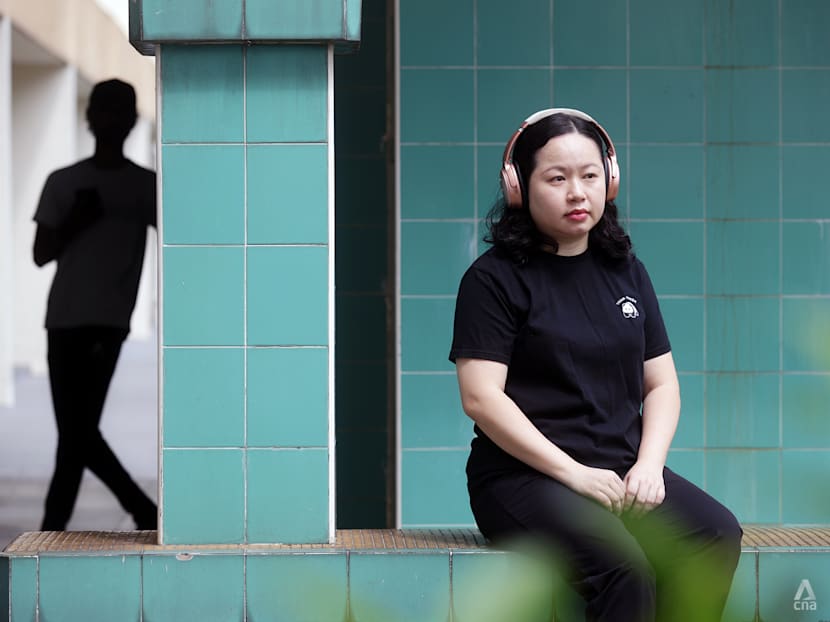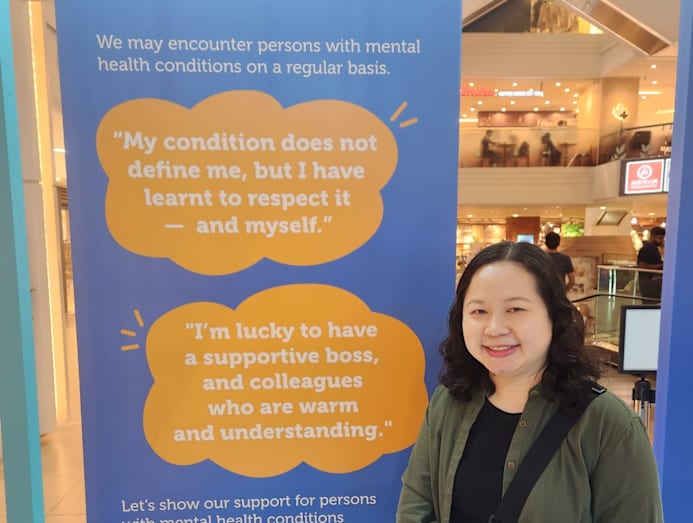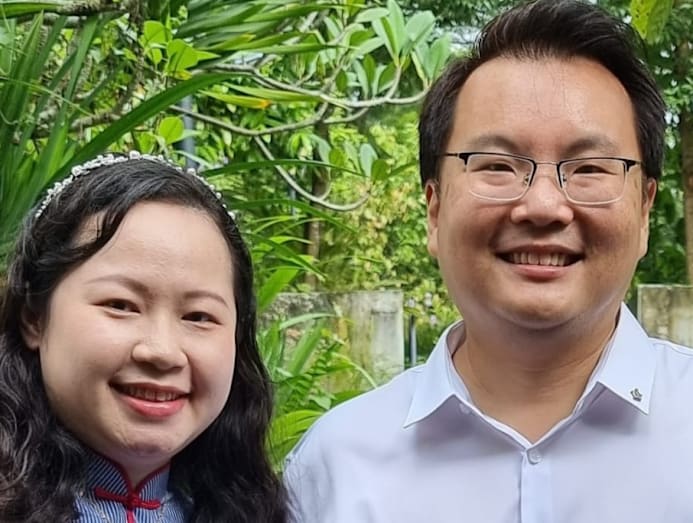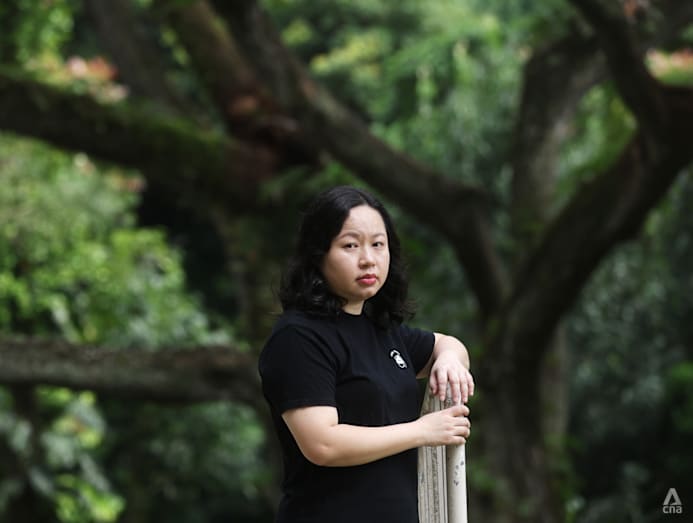The HR manager who faced cancer and autism diagnoses, got divorced and lost S$700k – all within 5 years
Just one of those life-altering events is enough to knock anyone off their feet but Wendy Boey managed to weather several hurricane-level storms in her life and is now a proud mental health advocate.

Ms Wendy Boey was diagnosed with autism in 2023 and uses noise-cancelling headphones when commuting. (Photo: CNA/Ooi Boon Keong)

This audio is generated by an AI tool.
Warning: This story contains references to suicide
While the COVID-19 period was a difficult time for a lot of people, for Wendy Boey it was the start of what can only be described as a marathon of misery.
Towards the end of 2019, just before the pandemic, her 12-year marriage was falling apart.
Struggling with stress and anxiety, she attempted to commit suicide. She survived, only to be hit with a stage 1 breast cancer diagnosis in early 2020. She went to see a doctor when she felt a sharp pain one day.
As 2021 began, her marriage was over and her cancer treatment was in full swing.
Sometime in April, a few months after her divorce was finalised, she went on the dating app Tinder to seek out love again – only to become entangled in a love scam.
Over three months, she lost S$700,000 (US$541,000) to a man she thought she had fallen in love with. Despite police investigations, the man – and her money – disappeared into thin air.
Three weeks ago, when I met Ms Boey, 43, a projects manager with public relations and communications firm Weber Shandwick, she was dressed simply in black with barely any make-up.
As other diners chatted happily over truffle fries at a cafe in Buona Vista with pop tunes playing in the background, she sat with a notebook in hand, pages filled with neat, small handwriting.
I could see why she needed to refer to her notes as we spoke – her life story reads like a multi-episode biopic, complete with cliffhangers at each turn.
I marvelled at how composed and matter of fact she was in recalling some of the most harrowing moments in her life.
We started with her most recent life-altering moment: being diagnosed with autism spectrum disorder (ASD) when she was 41. What was that like?
"On the morning she (the doctor) gave me the diagnosis, I just burst into tears, crying uncontrollably," she said.
"It struck me that there is no cure. It is not like I can take medication, and I will feel better the next day."
She went to see a private psychiatrist because of her persistent low moods and crying spells. After a series of screening tests, she was diagnosed with ASD level 1, the mildest form of ASD.

Singapore has one of the highest autism rates globally – one out of 100 children aged 18 months is diagnosed with the neurological condition. But data relating to adults is much less clear because very few specialists focus on adult autism. And for Ms Boey's generation, there was much less awareness of neurodivergence.
Experts say that people diagnosed late in life would have struggled with social norms, anxiety and depression pretty much all their lives. But they learn how to mask their symptoms.
Looking back, Ms Boey said she could see the patterns of masking in her life.
This includes her time in school when she couldn't understand why friends would distance themselves from her when she shared her "unfiltered views" or why she found it hard to network after work or to make small talk with clients.
"I guess it was also why I couldn't stay at any company for more than three years, until this job came along. I would be doing well but somehow, something will not align with me and it would become physically impossible to carry on, so I leave."
The irony is that she worked in human resources and yet was a job-hopper herself, she said, adding that she has lost count of how many jobs she's had but it's certainly more than 10.
SLIDING INTO A DARK HOLE
When asked, she's unsure if having autism played a part in her giving most of her life savings to someone she had never met in person.
But she knows for sure that she was particularly vulnerable and lonely when her marriage ended and she had to navigate her cancer diagnosis and treatment alone.
She recalled becoming quite obsessed with finding love again, swiping endlessly on the dating app and even paying for a premium dating account to improve her chances of success.
"I mean, there are so many people in the world, right? I don't believe I couldn't find someone who could care for me, accept me for who I am. So, I was swiping like crazy ... I didn't have boundaries in a sense and just chatting with everyone," she says without a tinge of emotion.
She met men who were cheating on their wives, cross-dressers and those looking for one-night stands.
Eventually, she landed on possibly the worst match – a scammer. He appealed to her religion and to her goodness in helping others in need. They chatted every single day and he showered her with what she needed most: attention.
Slowly, she found herself withdrawing larger and larger sums of money to transfer to his account for all kinds of "urgent" requests straight out of a well-worn playbook including that his business had gone under and he had no cash for survival.
When her savings ran out, she cashed out her insurance policies.
I gasped when she revealed this: In less than four months, she had sent him about S$700,000.
She smiled ruefully and said: “Yeah. The cost of an HDB flat, right? Looking back, I guess I was too trusting.”
Finally, when her well ran completely dry, she turned to her parents who called the police. Unfortunately, the case was closed with no arrests or recovery of funds or who the scammer really was.
Her parents were understandably upset but she was "masking" with them too.
"In front of them, I pretended that I was ready to move on. And we didn't talk about it," she said adding that she spent most of her time holed up in her room.
How did she feel about being a victim?
She didn't give me a straight answer.
"I asked a friend recently if it would be more heartbreaking to lose love or lose money," she said.
"My friend chose money. But to me, I don't know actually."

Despite that ordeal, Ms Boey went back to swiping on the app soon after, determined not to let the incident block her quest to find love.
Her persistence paid off and barely three months later, she found a man she is now married to.
FINDING LOVE AGAIN
This time round, she put some new safety rules in place for herself including meeting her dates in person. Being upfront about her life, especially about how she had fallen prey to a scam, was also a good way to weed out unsuitable men.
"Most of them were very judgmental and said: 'How can you be so stupid?'. My (now) husband was the only one who didn't say anything like that. Instead, he said: 'That must have been a painful loss'," she said.
Her husband, Mr Wong Yew Tuan, 45, a finance professional, had been on the dating app for only less than two months when he struck up a conversation with Ms Boey.
They hit it off quickly because both were clear about their objective: If they started dating, it would be serious because they were both hitting 40.
In a phone conversation I had with a soft-spoken Mr Wong later, he said: "I found her very real; there was no pretence. I began to understand that everything that happened, there’s a deeper reason behind it.
"I put myself in her shoes and felt that she was very strong to have gone through all that. People think those with mental health issues are weak but that’s not true," Mr Wong said.
The couple dated for slightly more than a year before marrying in June 2023.
Related:
This relationship coincided with Ms Boey getting a temporary contract with her current employer. And while things began looking up, her anxiety continued to bubble away in the background.
It came into sharp focus when she was asked to go into the office as part of a hybrid work arrangement as Singapore moved out of pandemic-related work-from-home arrangements.
"I found going into the office very unbearable. I am not sure why; I had been able to do that for other jobs," she recalled.
"I had no energy, no motivation. I started crying very frequently with no triggers. I was so worried my cancer would come back because of all the stress I was going through."
Thinking it was perimenopause, she went to see her gynaecologist who referred her to a psychiatrist. In addition to her recent autism diagnosis, she was told she had dysthymia, a mild but long-lasting form of depression.
Ms Boey was put on medication which she said has worked well for her.
But she was just past her six-month confirmation period and was worried about what did this would mean for her job and if she should let her employers know.
WE'RE ALL HUMAN
After much deliberation, she decided to be upfront with her employer, the same way she had always been upfront with her husband.
Ms Boey's manager, Ms Susie Bates, Weber Shandwick's chief people officer for Asia Pacific, recalled that the day Ms Boey came to her to have a serious chat was just seven months into her job at the company.
"Even though we haven't been working together very long ... she felt safe in saying: 'Hey, I need to let you know I've just got this diagnosis. I'm not really sure how I feel about it, but I just need you to know'," recalled Ms Bates, Weber Shandwick's chief people officer for Asia Pacific.
Ms Bates, who is based in Hong Kong, told me over a Zoom chat that her immediate response to Ms Boey was: "Tell me how we can support you."
I remarked that this is not a usual response – many more people choose to hide their symptoms rather than go to their managers, fearing negative consequences on their career. Ms Bates said this mindset needs urgent change.
"The assumption that everybody's able to function nine to five, five days a week, and then disappear, is ridiculous," she said.
"We're human. We have bad hair days; our kids have dentist trips. We get fevers."
There is no fixed solution for these situations and sometimes it is a frank admission that the environment is not suitable, she said. Other times it could be taking a break or adjusting hours or in Ms Boey's case, working entirely from home, said Ms Bates.

AN ADVOCATE FOR OTHERS
Ms Boey now has renewed wind in her sails.
Aside from her work in crafting and implementing mental health initiatives for her company, she is also a Beyond the Label (BTL) ambassador.
The Beyond the Label Collective is a partnership of several sectors in Singapore co-led by the National Council of Social Service (NCSS) and TOUCH Community Services.
Their aim is to spread awareness of mental health, reduce stigma and increase social inclusion.
This year, the focus is on the workplace. Given that six in 10 people with mental health needs hold full-time jobs, employers play a critical role in how they manage their conditions.
Ms Boey knows that being so open about her story is unusual – something she believes is important in her new role as a BTL ambassador.
She makes it clear that her life is far from perfect. She still relies on medication and there are some really tough days. Recently, a particularly vivid bad dream left her in distress all day, unable to work effectively.
"At my lowest, it felt like I was in a tunnel, and it is so dark, I cannot see anything. It is a very lonely journey.
"But I learnt that if I keep walking, I will eventually find the light. I also know that you don’t need to walk alone."
Where to get help:
National mental health helpline: 1771
Samaritans of Singapore Hotline: 1767
Singapore Association for Mental Health Helpline: 1800 283 7019
You can also find a list of international helplines here. If someone you know is at immediate risk, call 24-hour emergency medical services.










